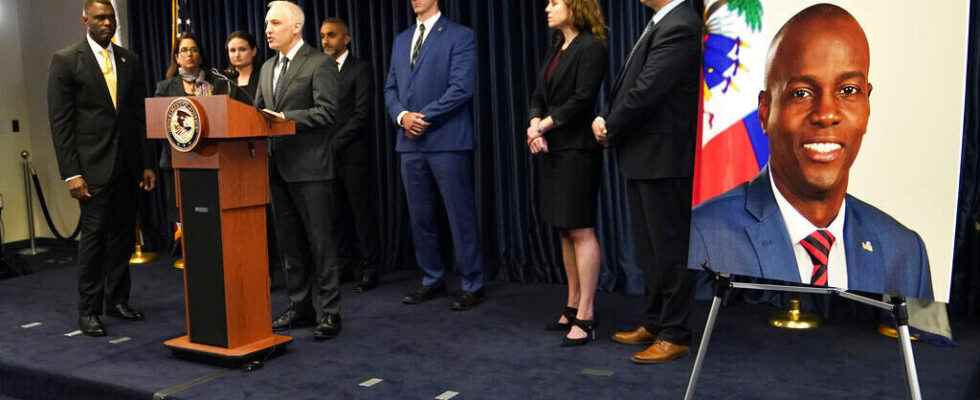four men, accused of planning and financing the July 2021 assassination of Haitian President Jovenel Moïse, were arrested Tuesday morning in Florida, where they reside. Arcangel Pretel Ortiz, a 50-year-old Colombian, Antonio Intriago, a 59-year-old Venezuelan, and Walter Veintemilla, a 54-year-old Ecuadorian-American, were all owners of private security companies based in South Florida. The fourth, Frederick Bergmann, a 64-year-old American, is suspected of having given them material support.
Frantz Duval, newspaper editor Le Nouvelliste points out that of the four men arrested on Tuesday by the American authorities, three, namely the Colombian, the Venezuelan and the American of Ecuadorian origin ” were already listed in the first report prepared by the Criminal Affairs Office of the Central Directorate of the Haitian Judicial Police “, a report published ” on August 2, 2022, less than a month after the assassination of President Moïse. Only the fourth defendant, the American Frederick Bergman is a newcomer to this case “, notes Frantz Duval in his editorial of the day. Besides, Le Nouvelliste wonders: of the eleven people in prison in the United States, almost all have been identified by the Haitian police ” who did his job “. His ” leads (were) strong enough for US justice to follow up and initiate indictments “.
THE Miami Herald emphasizes that while over 40 individuals have been arrested in Haiti in connection with the assassination of Jovenel Moïse, no one has yet been formally charged. The Haitian investigation is on its fifth investigating judge, which has blocked its progress “.
► Also to listen: Investigation into the murder of Jovenel Moïse: Haiti lagging behind?
The situation in Haiti will be at the heart of the Caricom summit which opens this Wednesday in Nassau in the Bahamas
will participate ” Prime Minister Trudeau and Special Advisor to the President of the United States for the Americas, former Senator Chris Dodd ”, reports again Le Nouvelliste. ” Haiti’s unelected Prime Minister Ariel Henry is also expected to visit. “, says the Canadian site News. Upstream, ” Bahamas Prime Minister Philip Davis says his country is not ruling out sending troops to help Haiti fight the gang violence that is ravaging the country “, reports the Jamaica Gleaner. The newspaper recalls that recently the Jamaican Prime Minister, Andrew Holness, had already indicated that his country would be ready to participate in a multinational security team aimed at stabilizing Haiti “.
The Caribbean countries have also turned against the United States. And they ” will plead for the United States to take its responsibilities in the face of illegal arms trafficking circulating in the region and which are used in criminal activities. It is a fact that the countries of the Caribbean produce neither weapons nor ammunition, explains the site of Radio-Canada. ” However, 90% of the weapons seized, for example, at crime scenes in the Bahamas are of American manufacture. The United States therefore plays an undeniable role in the armed violence raging in the Caribbean and particularly in Haiti. “.
Demonstrations in Colombia for and against the reform of the health system
The Spectator considers that the reform project responds to the main problems of the current health system: “ the reform aims to improve the dignity of health personnel, the question of the financing of clinics and hospitals. But the most remarkable thing is the initiative which aims to radically improve access to care in rural areas. “. The problem, underlines the editorialist, is that Gustavo Petro no longer makes an effort to unite the Colombians, yet half of them did not elect him.
El Colombianorightly, points out that the president has decided to impose his reform against all odds: “ He ignores the polls that demonstrate, survey after survey, the satisfaction of Colombians with the current system. It also ignores international comparisons that rank the Colombian health system among the best in the world. “.
The problem is that access to quality care is very unequal in Colombia. The newspaper El Tiempo believes that in this sense Gustavo Petro shows himself ” consistent “: ” The discussion it raises goes far beyond the country’s health care system. It is in fact about the moral limits of the market and the obligation of the State to provide certain services which should not be subject to the laws of supply and demand. “.
► To read also: Colombia: the supporters of the head of state in the street to defend his reform of the health system
► To listen: Colombia: Gustavo Petro presents his health reform
